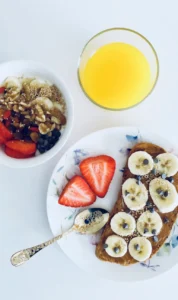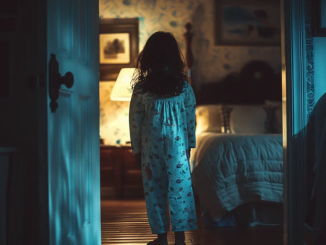
It’s a no-brainer that sleep is vital for one’s health. That is why so many researchers study the best way to get good quality shut-eye. However, forget chamomile tea and meditating before bed. According to new research, women sleep better next to dogs. That’s right; Canisius College in New York State conducted a study that found that canines make better-sleeping partners than humans or cats.
“We found that women commonly rate dogs as better bed partners than cats and human partners and report that their dogs enhance their sleep quality,” Christy Hoffman, Ph.D., animal behaviorist and lead researcher of the study.
Research Finds that Women Sleep Better Next to Dogs
Hoffman surveyed almost one thousand women living in the United States to come to these findings. The results showed that 55% of the participants shared their bed with at least one dog and 31% with at least one cat. Also, 57% of these women shared a bed with a human partner, while the rest did not. [1]
Hoffman also discovered why dogs seemed to make the best bed companions. The first reason is that dogs’ sleeping patterns, as opposed to cats, more closely resemble those of humans.
“The difference between dogs and cats is not surprising because dogs’ major sleep periods tend to coincide more closely with humans’ than do cats,’” said Hoffman.
However, while there may be benefits of these similar sleeping patterns, more research is needed to know for certain. But Hoffman has some ideas of how this could work.
“In comparison to human bed partners, dogs may be better at accommodating their human’s sleep schedule,” she said. “It’s not uncommon for human bed partners to go to bed at very different times and wake up at very different times. Such differences in partners’ schedules can certainly disrupt sleep. It may be that dog bed partners adapt more readily to their owner’s schedule than do human bed partners.”
Moreover, dogs require certain schedules and responsibilities, such as a morning walk. This kind of regime helps their owners maintain a routine, improving sleep quality as a result.
Stillness and Security
Additionally, dogs tend to stay stiff as they sleep. Anyone who’s slept with a fidgety partner knows how disruptive they could be. However, women in the study reported that their dogs stayed on the bed most of the night instead of felines, who tended to come and go.
“This suggests that cats may be more likely than dogs to create disruptions by moving on and off the bed during the night. In addition, we found that dog owners kept to more consistent bedtime and wake time schedules than cat owners and also tended to go to bed earlier and wake up earlier than cat owners,” Hoffman said.
Here’s the third and most important reason: Canines provide a sense of security to their owners. More so than with cats or even human partners.
“Some dog owners may take comfort in the thought that their dog will alert them in the case of an intruder or other type of emergency; furthermore, a dog’s bark may deter a potential intruder. A cat is less likely to take on this role, and so, may not provide psychological comfort in the same way a dog might,” said Hoffman.
The Best Partner for Quality Sleep
However, while the study suggests that dogs are the perfect slumber buddies, their benefits are subjective to each case. For example, a dog could snore or make the bed too hot. Additionally, there are many owners who find that their cats help them sleep.
Keep in mind that the research was based on how the volunteers perceive their pets’ effects on their sleeping quality and duration. As a result, more objective research is needed to definitively consider dogs the superior sleeping partners. However, Hoffman believes that these studies could be beneficial as many American households have pets.
“It will be valuable to continue this line of research so we can develop a clearer picture of the contexts under which pets and their presence in their owner’s bed may positively impact sleep quality, and the contexts under which co-sleeping with a pet may be detrimental to one’s sleep quality,” she said.
For instance, research has also shown that women sleep better while alone than with a human, but many believe in the opposite. Future research could use Fitbit-like devices to objectively track the sleep quality of people in different sleeping conditions.
The Outfit That Sparked a Wedding War: Did I Go Too Far…
Claire just wants to be the beautiful mother of the groom. But when she finds out that her daughter-in-law has her own ideas for the wedding, Claire decides to focus on her outfit. This leads to a fight between her and Alice on the wedding day. Alice claims that Claire ruined the wedding by taking her dream dress, while Claire thinks she did nothing wrong. Who is actually at fault?
All I wanted was to be the mother of the groom. That’s it. I just wanted to be a loving mother who adored her son more than anything. But this is the story of how my effort to make my son’s wedding perfect turned into a day we’d all rather forget.

When Mark introduced Alice to us, she was nothing like the person I expected him to fall in love with. Mark, my son, is a lawyer at a top firm, a job he got right after graduating from Stanford.
I’m going to be a lawyer, Mom,” he once told me when he was in high school and working on an essay about his future career.
“I can see that,” I said, making him breakfast as he studied.
“It’s to help fight injustices. For children, specifically,” he added, sipping his orange juice.
Mark had big dreams, and I knew he would always reach for the stars.
Alice was different from Mark. She was light and carefree, while Mark was serious and thoughtful. Alice was a self-taught coder who worked from their cozy apartment. Their personalities, views, and interests didn’t match.
But they made it work—and they were a sweet couple for the most part. But love can be blind.
When Mark proposed to Alice, we were invited to help surprise her.

“Please, Mom,” Mark said on the phone. “Alice isn’t close to her family, so having you and Dad there will show her she’s supported.”
“Of course, honey,” I replied, imagining their wedding.
I put aside my worries and offered to pay for the wedding. James and I had saved money for Mark’s education, but he had received scholarships that covered it all.
“We can use that money for the wedding, Claire,” my husband suggested at lunch the day after the proposal.
“It’s the best thing we can do for them,” I agreed. “This way they can save to move out of that small apartment. I know Mark wants a house with a garden for a dog.”
When we told Mark and Alice, I thought it would bring us closer. I didn’t have any daughters, so I saw this as my chance.

I could get to know Alice better—and it would be good for Mark to see that his wife and mother got along. But planning the wedding only highlighted our differences.
A few months into the planning, I met Alice at a coffee shop to discuss details. But we clashed over everything.
“I think roses are timeless,” I said, enjoying a slice of cake.
“They are, but they’re also overdone,” Alice replied, sipping her tea. “Mark and I want peonies.”
We went back and forth and couldn’t agree on anything.
“How about this?” I suggested. “You pick everything else, and just tell me the color of the bridesmaids’ dresses, so there won’t be any clashes.”

“They won’t be wearing green,” she said. “I’m leaning toward pink.”
I paid the bill, and we parted ways without resolving much.
Then one afternoon, Alice texted me.
“Hi Claire, just picking out my wedding dress with the girls! I wish you were here!”
She attached photos of her top five dress picks.
I knew Alice and I had different ideas about the wedding, but I wanted to be included in the big decisions. I wished she had invited me dress shopping.
“At least she’s sending you the top picks,” James said as he read the newspaper beside me.
“I know, but it’s not the same,” I replied.

“Do they look good?” he asked. “Can I see them?”
We scrolled through the dress photos together. They were fine, but nothing special.
None of them seemed to meet the standard I expected for my future daughter-in-law.
Alice’s favorite dress wasn’t what I expected.
I typed back, telling Alice it wasn’t the best choice and hoped my financial support would matter. James and I hadn’t set a budget; they had everything available to them.
“Why not consider the second one? It might be more flattering for you.”
James chuckled beside me.
“You’re overstepping,” he said.
Before I could respond, I got a message from Alice.
“Sorry, but I disagree. This is the dress I’m choosing.”
That night at dinner, as James plated our salmon, I shared my frustration.

“Alice isn’t even considering my opinion, and I’m paying for the dress!” I said.
James tried to mediate and even texted Mark to let him know how I felt.
“I think you should let them handle the wedding planning now,” he said. “Focus on yourself and your dress.”
Mark eventually convinced Alice to wear the dress I preferred.
I had to admit, it was the easier option, and I hadn’t had time to shop for my dress before that.
So, I visited a few boutiques and found my perfect dress. It was emerald green, which I knew would highlight my eyes.
“That’s beautiful,” James said when I tried it on for him.
I felt different. I no longer felt like the sidelined mother of the groom. Instead, I felt beautiful and confident every time I thought of the dress.

As the wedding week approached, James and I made sure to be present at all the events Mark and Alice needed us to attend, including the rehearsal dinner, where we raised our glasses to toast them.
“All sorted, Mom?” Mark asked me. “Your dress and everything?”
I smiled at my son. Even with the tension between Alice and me, he always checked in on me.
“Of course,” I replied. “I’m ready to celebrate you and Alice.”
On the morning of the wedding, I put on my green dress and did my makeup. It was everything I had wanted to look like for my son’s wedding—elegant and classy.
When I arrived at the venue, the atmosphere was thick with whispers. I ignored them, thinking everyone was just surprised to see me in something different.

I went straight to the bride’s dressing room, hoping to see Alice and compliment her before she walked down the aisle.
When I opened the door, Alice looked up, and her joyful expression turned into one of devastation. She looked me up and down and then burst into tears.
“Why did you do this to me, Claire?” she sobbed, her voice choked with emotion.
Confused, I stepped into the room and closed the door.
“What’s wrong?” I asked.
“Your dress!” she exclaimed.
“What about it?” I asked, second-guessing everything.
“It’s my dream wedding dress, just in another color,” she said, nearly shouting.
I was taken aback.
“Alice, honestly,” I said. “I didn’t realize—they look so different in color.”
But Alice wasn’t listening. She sat on the couch, her head in her hands.

“How could you?” she cried. “You’ve made this day about you! Just because we didn’t take any of your suggestions!”
Mark, hearing the commotion from his dressing room, rushed in.
“Mom? What’s going on?” he asked, looking between us for an explanation.
Trying to calm the situation, I explained slowly.
“I didn’t see the resemblance, Mark,” I said. “I truly just loved the dress, and I thought—”
Alice stood up and marched toward Mark.
“No!” she shouted. “You thought you’d show me what I could’ve had, but in green. Isn’t that it?”
“Mom, please,” Mark said. “Let’s just try to get through the day. Please, for me.”
I agreed and left the dressing room, wanting to find James and sit quietly until the day was over.

I knew Alice and I were on a thin line, but I didn’t expect her to shout at me like that.
Naturally, I was upset, but I didn’t want to ruin their day any more.
Looking back, maybe I should have been more open to Alice’s wishes. It was her day after all, not just mine to control. The question of whether I was wrong weighs heavily on me.
Yes, in trying to impose my vision, I may have lost sight of what truly mattered—Alice’s happiness and Mark’s peace on their special day.
Was I wrong for what I did?



Leave a Reply